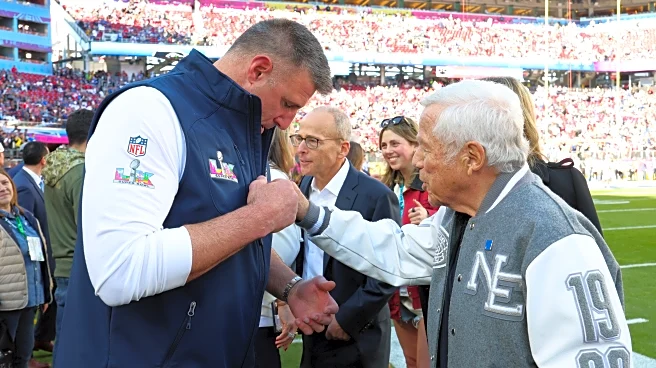What's Happening?
Lincoln Riley, head coach of the University of Southern California (USC) football team, is under scrutiny following a rain-soaked loss to Notre Dame that jeopardizes USC's College Football Playoff hopes.
Riley's decision-making during the game, particularly a reverse pass play, has been questioned by fans and commentators, including rapper Snoop Dogg. Despite the criticism, Riley has defended his dual role as head coach and playcaller, suggesting it provides an advantage to the team. However, the balance between these roles is challenging, as evidenced by other coaches who have relinquished playcalling duties to achieve success.
Why It's Important?
The criticism of Lincoln Riley's playcalling is significant as it highlights the challenges faced by head coaches who also serve as playcallers. This dual role can impact team performance and strategic decision-making, potentially affecting USC's chances in the College Football Playoff. The broader implications for college football include the debate over whether head coaches should focus solely on coaching responsibilities, leaving playcalling to specialized coordinators. This decision could influence team dynamics, performance, and ultimately, the success of college football programs.
What's Next?
USC will face Northwestern in the first round of the Big Ten tournament, providing an opportunity for the team to recover from recent setbacks. The outcome of this game could influence Riley's future decisions regarding his playcalling responsibilities. Additionally, the ongoing debate about the effectiveness of head coaches serving as playcallers may lead to strategic changes within USC and other college football programs, as they seek to optimize performance and achieve championship success.
Beyond the Headlines
The scrutiny of Lincoln Riley's playcalling raises questions about the broader culture of college football coaching, where the pressure to perform and achieve results can lead to controversial decisions. The ethical considerations of balancing multiple roles and the potential impact on player development and team morale are important factors that may influence future coaching strategies. This situation also reflects the evolving nature of college sports, where the integration of analytics and specialized roles could redefine traditional coaching practices.










